The campaign for the 2020 presidency is already well underway, and it promises to be an interesting and eventful race. Education policy is a hot topic on both sides of the political divide, and there are a number of proposals suggested that could change the landscape of education in America if implemented.
Since we’re all about education here at College Raptor, we wanted to check out the educational backgrounds of the 2020 candidates! Where did they go to college? What did they study? What are some commonalities between the candidates? We’ll break it all down in the nifty infographic below.

Since education is a key point in many of the candidate’s platforms, we wanted to also cover everybody’s personal experience with education as well as their proposed education policies.
Check out the policy overviews below!
DEMOCRATS
Let’s start with the Democrats. As of the third major debate (October 15th, 2019), there are a record-breaking 19 candidates still in the race for the Democratic nominee.
While many Democrats agree on certain issues, they aren’t always of the same mind when it comes to how to implement changes.
Michael Bennet — Senator (CO)
- Wesleyan University: BA in History
- Yale University: JD

Son of an elementary school librarian and former President and CEO of NPR, Michael Bennet has long been influenced by and involved in the education sphere. Bennet even served as superintendent of Denver Public Schools, increasing graduation rates and college enrollment numbers, while decreasing dropout rates.
Like many Democrats, Bennet believes in expanding and/or fixing current student debt-relief programs, particularly the Public Service Loan Forgiveness program (PSLF). He co-wrote legislation that overhauled No Child Left Behind, and even advised former President Barack Obama on education policy matters. Bennet also supports expanding Pell Grants. He co-sponsored the Finish Act, aimed towards increasing access to higher education to high-need students.

Joe Biden — Former Vice President
- University of Delaware: BA in History & Political Science
- Syracuse University: JD

In addition to his BA and JD degrees, Joe Biden has also earned a number of honorary degrees over the years. In fact, he’s been awarded 13 from colleges (both domestic and abroad) including the University of Pennsylvania, Emerson College, Colby College, and both alma maters. Biden also received two prestigious awards from Syracuse—the Chancellor Medal and George Arents Pioneer Medal.
During his service as VP in the Obama administration, Biden supported the idea of making 2 years of community college (or technical school) free, extending US public education beyond the 12th grade. Additionally, Biden has called for PSLF reformation, stating that the program should be “fixed, simplified, and actually [help] teachers.” Biden announced an education plan on May 28th, 2019 that outlined giving teachers raises, increasing federal spending on school districts serving low-income students, and that rigorous coursework (like AP classes) should be available at all schools.
Cory Booker — Senator (NJ)
- Stanford University: BA in Political Science
- Stanford University: MA in Sociology
- The Queen’s College (Oxford. England): MA in History
- Yale University: JD
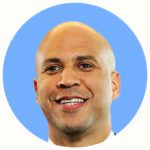
Senator Cory Booker has more higher education degrees than any other 2020 presidential candidate. Booker earned a Rhodes Scholarship and studied at the Queen’s College in England, a constituent college of Oxford University. He’s a former member of the Executive Committee at Yale and the Board of Trustees at Stanford. Currently, he’s on the board of trustees at Columbia, and board of advisers for the Democrats for Education Reform committee.
In terms of education, Booker is an outspoken advocate for debt-free college and an increase in federal aid. In fact, along with Senators Gillibrand and Harris, he’s working on legislation that would help students and their families avoid taking out loans by having the federal government match state aid spending.
Steve Bullock — Governor (MT)
- Claremont McKenna College: BA in Politics, Philosophy, & Economics
- Columbia University: JD

Not only did Steve Bullock graduate from the prestigious Columbia University, he did so with honors. He triple majored during his undergraduate schooling at Claremont McKenna College in California. His mother was a school board trustee, and his father was both a school teacher and administrator.
When Bullock graduated law school, he’d accumulated $100,000 in student loan debt—adjusted for inflation, that would be $175,000 nowadays. In a self-written CNN article, Bullock called for realistic solutions to the student debt problem in America. He suggested limiting student loan interest rates, ending predatory for-profit colleges, incentivizing employers to help pay off their employees’ debts, making aid more widely available, and honoring the promise of loan forgiveness for those who enter public service careers.
Pete Buttigieg — Mayor (South Bend, IN)
- Harvard University: BA in History & Literature
- Pembroke College (Oxford. England): BA in Philosophy, Politics, & Economics

Pete Buttigieg holds a number of impressive academic accolades. He was a high school valedictorian, graduated magna cum laude from Harvard, and earned a Rhodes Scholarship to study at Pembroke College, part of Oxford University. His father served as a professor of literature at Notre Dame University for 29 years.
Buttigieg has a number of thoughts and plans when it comes to education policies. Among them, increasing Pell Grants, free college for low- and middle-income students, and requiring states to take on additional higher education costs to make college more affordable. Buttigieg also proposed a debt relief plan, forgiving debt in exchange for national service.
Julián Castro — Former HUD Secretary
- Stanford University: BA Political Science & Communication
- Harvard University: JD
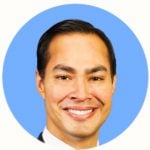
A firm believer in Affirmative Action, Julián Castro graduated both Stanford and Harvard Law with his twin brother Joaquin (who is now a US Representative). Both Castros got into politics early, tying in the number of votes for student senate seats while at Stanford. Julián cites his mother as the largest reason he got into public service, as she took him and his brother to rallies when they were children.
Back when he was Mayor of San Antonio, Castro proposed a universal Pre-K program and now wants to extend it nationwide. He believes that money for education is an investment in the future, rather than charity. Castro has also called for teachers to receive a tax credit—up to $10,000 and a minimum of $2,000. He insisted that the minimum be raised for teachers serving low-income students.
John Delaney — Former Representative (MD)
- Columbia University: BA with a Concentration in Pre-Med and Biology
- Georgetown University: JD
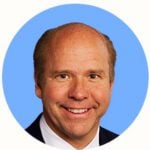
Before he represented the state of Maryland in politics, John Delaney graduated from two powerhouse schools. Both Columbia University and Georgetown University feature on College Raptor’s 50 Best Colleges in the US 2020 rankings—at #8 and #34 respectively. He met his wife April at Georgetown.
Delaney signed the America’s College Promise Act proposal, which would make two years of community college free to attend by providing a $3 federal match to every State dollar invested. He intends to lower student loan interest rates, believes in universal Pre-K schooling, and wants to make education more flexible, thinking that charter schools could be part of that solution.
Tulsi Gabbard — Representative (HI)
- Hawaii Pacific University: BSBA in Business Administration
 Born in American Samoa and raised in Hawaii, Tulsi Gabbard attended Hawaii Pacific University, where she majored in business. She was honored at her alma mater as the 2018 Paul T.C. Loo Distinguished Alumni. At just 21 years of age, she became the youngest woman elected to State legislature. She’s also the very first Samoan-American and Hindu Congressmember.
Born in American Samoa and raised in Hawaii, Tulsi Gabbard attended Hawaii Pacific University, where she majored in business. She was honored at her alma mater as the 2018 Paul T.C. Loo Distinguished Alumni. At just 21 years of age, she became the youngest woman elected to State legislature. She’s also the very first Samoan-American and Hindu Congressmember.
In terms of education, Gabbard believes in free tuition at public 4-year colleges—provided the student’s parents make less than $125,000 per year. Community colleges, however, would be free for all. She supported the Every Student Succeeds Act, which gives states more flexibility in how to determine student success while also encouraging innovation in education.
Kamala Harris — Senator (CA)
- Howard University: BA in Political Science & Economics
- University of California — Hastings College of Law: JD

Daughter of a Stanford economics professor, Kamala Harris was quite involved with her peer community at Howard University. She served on the liberal arts student council, participated on the debate team, created mentor programs, and more. At UC Hastings, she was elected President of the Black Law Students Association (BLSA).
Senator Kamala Harris has proposed one of the more ambitious education reform action plans. First, she called for a $13,500 raise for teachers, paid for by increasing estate tax on wealthy millionaires and billionaires. Teachers serving in high-need schools would likely see an even higher raise. Additionally, she believes in debt-free college and plans on making public 4-year colleges tuition-free for most Americans.
Amy Klobuchar — Senator (MN)
- Yale University: BA in Political Science
- University of Chicago: JD

Amy Klobuchar’s experience with education started at a young age, considering her mother was an elementary school teacher. She was valedictorian at her high school, graduated magna cum laude from Yale, and acted as an associate editor of the University of Chicago Law Review in grad school.
Though Klobuchar is not for free 4-year college for all, she does advocate for 2 free years of community college. Beyond that, Klobuchar has called for every person with student loans to be able to refinance at an interest rate of around 3%. She also believes in expanding the Pell Grant program, as well as loan forgiveness for public service employees.
Wayne Messam — Mayor (Miramar, FL)
- Florida State University: BS in Management Information Systems
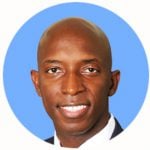
The son of immigrants from Jamaica, Wayne Messam is a big believer in the American Dream. He earned a bachelor’s degree in Management Information Systems and went on to start his own construction business. While at Florida State University, he played football for the Seminoles.
Wayne Messam’s main stance on education policy revolves around resolving the massive student debt crisis. He proposes an ambitious $1.5 trillion one-time debt cancellation. In his campaign video, Messam declared, “Every day people are graduating from universities with crippling debt, stifling their opportunity for financial mobility.”
Beto O’Rourke — Former Representative (TX)
- Columbia University: BA in English Literature

Before entering Columbia University, Beto O’Rourke served as a congressional intern for the office of Congressman Ron Coleman. During his junior year at Columbia University, O’Rourke co-captained the rowing team. Additionally, O’Rourke played the bass in a number of punk bands during his days at Columbia.
O’Rourke believes that investing in public education is vital to the future wellbeing of America. In an effort to close the funding gap for teachers, he’s proposed a $500 billion fund, paid for by a tax on Wall Street. Additionally, O’Rourke intends to diversify both teachers and student bodies in an effort to end racial disparities in education.
Tim Ryan — Representative (OH)
- Bowling Green State University: BA in Political Science
- University of New Hampshire – School of Law: JD
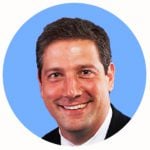
Initially attending Truman State University for football, Tim Ryan transferred to Bowling Green State University after a knee injury. He then went on to earn his Juris Doctor degree from the Franklin Pierce Law Center, part of the University of New Hampshire system. His wife Andrea is a school teacher.
Like many Democrats, Tim Ryan wants to tackle the issue of crippling student loan debt many graduates face after college. He cosponsored the Bank on Students Emergency Loan Refinancing Act, allowing borrowers to refinance at lower interest rates. Ryan is also a big supporter of educational transparency.
Bernie Sanders — Senator (VT)
- University of Chicago: BA in Political Science
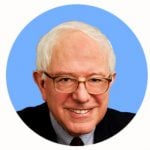
Bernie Sanders initially started out at Brooklyn College, but transferred to the University of Chicago after one year. While at UChicago, Sanders served as student chairman of the Congress of Racial Equality action committee, which he’s cited as a big inspiration for his journey into social activism.
Few candidates’ education policies are as intense as Bernie Sanders’. He believes that all public colleges and universities should be tuition-free, that all student loan debt should be canceled, and interest rates drastically reduced. In terms of financial aid, Sanders has called for increased work-study programs and that students shouldn’t have to apply for aid every year. Sanders proposed a significant raise in teachers’ salaries, suggesting a $60,000 starting salary.
John Sestek — Former Representative (PA)
- US Naval Academy: BS in American Political Systems
- Harvard University: MPA in Public Administration
- Harvard University: PhD in Political Economy & Government

Following his father’s steps, John Sestek enrolled at the US Naval Academy where he graduated 2nd in his class among 900. Afterward, Sestek continued on to Harvard to earn a Master of Public Administration (MPA) and a PhD in political economy and government. His mother was a math teacher.
Sestek has long supported STEM education. When it comes to the student loan crisis, he wants to turn the country onto profit-free loans to lower the cost of college. Additionally, he wants to create a national credit transfer system, so any student who wishes to change schools, or transfer from a community college to a 4-year college, won’t lose any credits in the move. A military man for 31 years, Sestek claims that “education is our best homeland defense.”
Tom Steyer — Activist & Philanthropist
- Yale University: BA in Economics & Political Science
- Stanford University: MBA in Business Administration

Tom Steyer double majored at Yale and graduated summa cum laude. At graduate school at Stanford, Steyer was an Arjay Miller Scholar. Later in life, Steyer served on Stanford’s board of trustees. Additionally, his brother, Jim, is a professor at Stanford.
“Without guaranteed access to a good education, there’s no such thing as equal opportunity,” Steyer says on his campaign website. “The Right to Learn” is included in his “5 Rights” philosophy that a successful society needs. He wants to protect free and quality education from PreK to college and beyond.
Elizabeth Warren — Senator (MA)
- University of Houston: BS in Speech Pathology and Audiology
- Rutgers University — Newark: JD
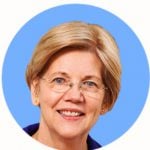
Initially dreaming of being a teacher, Elizabeth Warren has had an interesting educational journey. She attended George Washington University on a debate scholarship, though only went for two years. Later, she moved to Texas and enrolled at the University of Houston. After another move to New Jersey, Warren earned her Juris Doctor at Rutgers and passed the bar examination.
Much of Warren’s campaign has been built on promises of education reform. She intends to eliminate $640 billion worth of student loan debt, and make all public colleges free by imposing an “ultra-millionaire tax” on the super-wealthy. She also wants to provide additional funding to HBCUs. Warren advocates for more inclusion and equality in education, and making it more affordable across the board.
Marianne Williamson — Author & Activist
- Pomona College: Theatre & Philosophy (No degree awarded)

Marianne Williamson is the only candidate running without a college degree. She did attend Pomona College for two years, studying theatre and philosophy, but ultimately dropped out to pursue a singing career. Additionally, Williamson took classes at the University of New Mexico and the University of Texas. However, Williamson found great success as a self-help author, having published 13 books. She’s been heavily involved in charity work throughout the years.
Williamson has a number of education policy ideas, some mirroring her fellow Democratic candidates. She believes in student loan debt amnesty and free college education. On her campaign site, she’s outlined a number of initiatives including teacher retention programs, reducing high-stakes testing, increased funding for free / reduced lunches and breakfast in schools, and varied educational approaches among other things.
Andrew Yang — CEO & Entrepreneur
- Brown University: BA in Economics & Political Science
- Columbia University: JD

While attending Brown University, Andrew Yang majored in economics and political science. After earning his Juris Doctor at Columbia, Yang went on to found Venture for America—a non-profit fellowship program dedicated to creating economic opportunities. His mother worked as a systems administrator at a university, and his brother is a psychology professor.
Yang is the sole Democratic candidate that doesn’t believe in some form of free college education. Instead, Yang has called for other solutions, including limiting how much publicly funded schools can raise the cost of tuition year over year. He does, however, agree with fellow Democrats that teachers deserve a raise and that some student loan debt should be forgiven.
REPUBLICANS
While the Democrats have had multiple debates, and thus have had more time to talk about their ideas and proposals, we’ve gathered the Republican candidates’ viewpoints from past policies, speeches, or campaign websites.
Mark Sanford — Former Representative (SC)
- Furman University: BA in Business
- University of Virginia: MBA in Business Administration
 For his undergrad degree, Mark Sanford attended Furman University in South Carolina, the state where he served as both Governor and Representative during his political career. Additionally, Mark Sanford earned his MBA at the University of Virginia’s Darden School of Business. The University of Virginia is known as a top-ranked school—#18 overall in the College Raptor’s Best Colleges Rankings of 2020.
For his undergrad degree, Mark Sanford attended Furman University in South Carolina, the state where he served as both Governor and Representative during his political career. Additionally, Mark Sanford earned his MBA at the University of Virginia’s Darden School of Business. The University of Virginia is known as a top-ranked school—#18 overall in the College Raptor’s Best Colleges Rankings of 2020.
“Education is key, and to compete effectively in the 21st Century it’s vital everyone of us recognize how lifelong learning is important,” Sanford says on his campaign website. Sanford is a longtime advocate for school vouchers—believing that they allow families more choices when it comes to educational opportunities—supporting them as early as 1998. Sanford also has supported merit pay for teachers.
Donald Trump — 45th President of the United States
- University of Pennsylvania: BS in Economics

Initially starting his college education at Fordham University, Donald Trump transferred after two years to the University of Pennsylvania’s Wharton School. While at the Ivy League’s University of Pennsylvania, Trump dedicated himself to working for his family’s business—Elizabeth Trump & Son.
During his 2016 presidential campaign, Trump called Common Core “a disaster” and has since worked to abolish the standardized program, criticizing it as a one-size-fits-all model. He’s a firm believer in school choice, advocating for vouchers, charter schools, and allowing schools to compete for enrollment. In his 2020 budget proposal, Trump calls for the elimination of the Public Service Loan Forgiveness program (as it’s costly to American taxpayers), expansion of Pell Grants to short-term career programs, and creating a student loan risk-sharing program among colleges that receive federal aid.
Joe Walsh — Former Representative (IL)
- University of Iowa: BA in English Literature
- University of Chicago: MPP in Public Policy
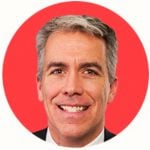
Born and raised in Illinois, Joe Walsh stuck to the midwest for his higher education. He attended Grinnell College and later, at the University of Iowa, he earned a bachelor’s degree in English Literature. For graduate school, he returned to Illinois and earned his Master of Public Policy degree. Early in his career, Walsh worked at a Jobs for Youth program and later became a teacher of American government and history at Oakton Community College and the Hebrew Theological College.
Like many Republicans, Joe Walsh supports vouchers and giving families the choice between public and private schools. On that end, Walsh ran the Daniel Murphy Scholarship Fund—which awarded low-income students scholarships to attend private schools—and raised money for the American Education Reform Council—which advocates for school choice. Walsh is also directly opposed to Common Core.
William Weld — Former Governor (MA)
- Harvard University: BA in Classics
- Harvard University: JD

William Weld has a very impressive education. He graduated summa cum laude from Harvard, with a bachelor’s degree in classics. Weld attended a year-long program at the prestigious Oxford University in England, where he studied economics. He then returned to Harvard to earn his Juris Doctor degree, with cum laude honors.
On the topic of state vs. federal education input, Weld falls on the state side, fighting against one national standard for education. In line with that, he also firmly believes in school choice, stating, “We need to support school choice. We need to support homeschooling. We need to support charter schools. And we need to consider abolishing the U. S. Department of Education, transferring decision-making authority to the States and the parents of school-age and college-age children.”
Sources: Politico.com, Ontheissues.org, BallotPedia.org, Candidate’s websites.
Interested in any of these schools? Check out College Raptor’s free match tool to discover if they’re a good fit for you!


